How To Officiate A Wedding And Write A Ceremony Script
Being a good wedding officiant involves a bit more prep than just pronouncing them man and wife.
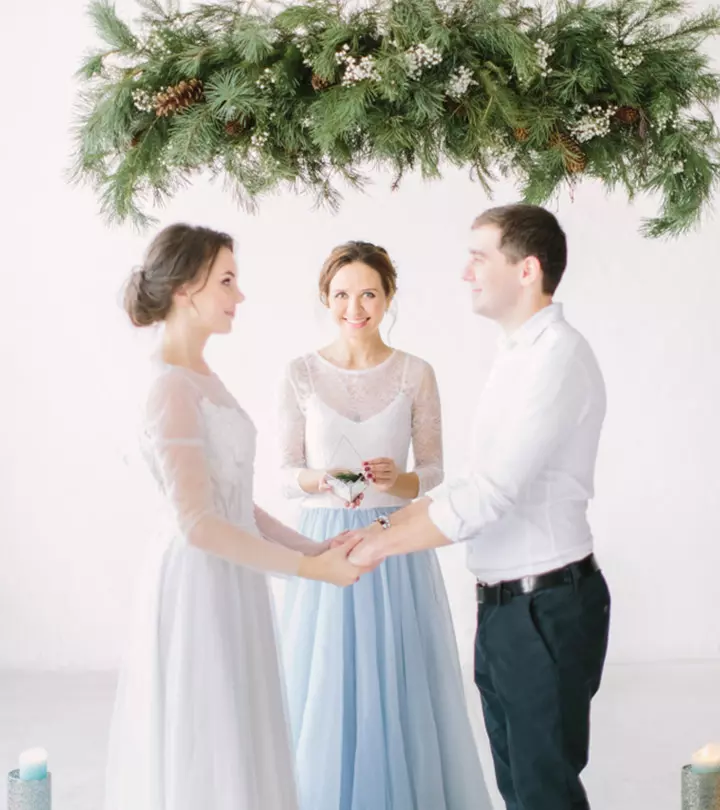
Image: Shutterstock
Are you wondering how to find a wedding officiant or how to officiate a wedding? This article will answer all your queries.
Weddings are special moments filled with celebrations, vows, and happy tears. And couples are also not hesitating to make their weddings even more exciting adding personalized changes. From glamorous pre-wedding photoshoots to choosing an exotic wedding venue, everything is being customized to enhance the whole experience.
One thing that’s getting rapidly popular among couples is choosing a friend or a family member to be their wedding officiant. You read it right! Couples are now turning to their loved ones to officiate their wedding. This adds a personal touch to the ceremony and saves them from the struggle to find a professional wedding officiant. So now, let’s understand how to accomplish this task.
In This Article
What Is A Wedding Officiant?
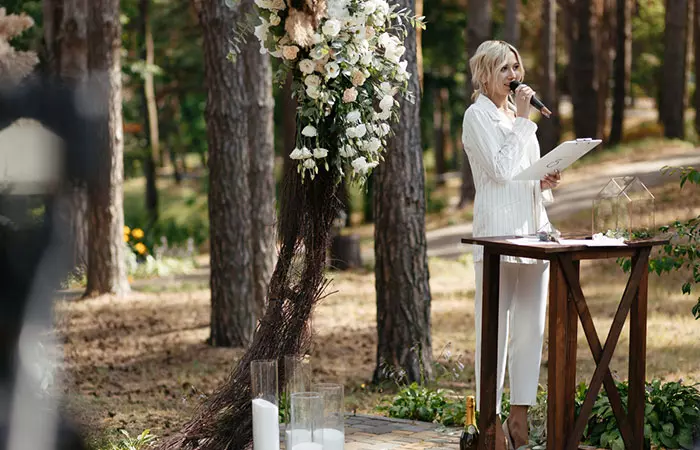
A wedding officiant or a marriage officiant is a person who leads the ceremony. They officiate a legal wedding ceremony and work with the couple to complete the paperwork and finalize the union.
Anyone can be a wedding officiant. They just need to get ordained to do so. Once they get an ordainment, they are legally eligible to conduct marriage ceremonies for anyone they wish to.
If you plan on becoming a wedding officiant, start the process at least a month in advance. This way, you can deal with any trouble or issue in time that may arise during the paperwork. Melanie Levin, an expert event planner from Southern California says, “I’d recommend 2-3 months minimum. Get the certification, meet with the couple, design the ceremony, learn the legal needs”.
That’s a lot of things to consider! Scroll down for more information.
Key Takeaways
- To be a wedding officiant, one has to get ordained, which means they are legally eligible for marriage ceremonies.
- Officiating a wedding is a process that involves research, planning, organizing, and conducting even post-wedding tasks.
- A memorable ceremony script should also be prepared after a consultation, including welcome, vows, blessing, and conclusion.
- It is always better to check the wedding attire and do a wedding rehearsal before the ceremony to avoid any mess.
Step-By-Step Guide To Officiating A Wedding
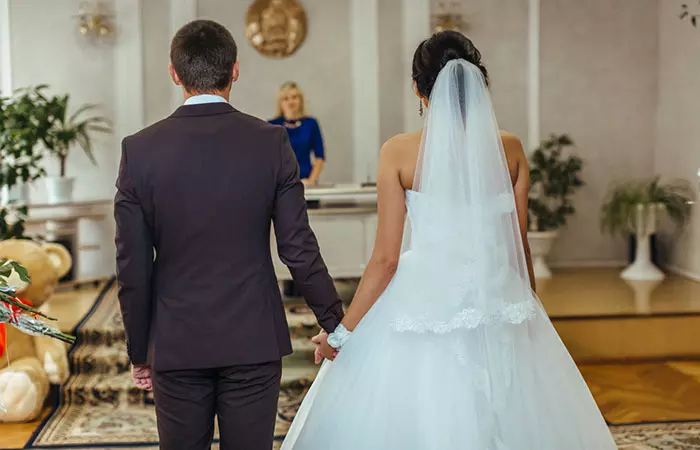
Here’s the part you have been waiting for – how to become a wedding officiant. The entire process is a bit long since it is a big responsibility. So, stay calm and read the pointers listed below.
Step 1: Do Thorough Research

A person cannot officiate a wedding unless the state or church authorizes them to do so. Therefore, since every state and religious organization has different rules, descriptions, classifications, and eligibility criteria, it is best to do proper research before jumping into the venture. Here are a few questions you can look for during your research:
- What are the eligibility criteria to become a wedding officiant?
- How long does it take to become a wedding officiant?
- Is the organization transparent about the process?
- What are the charges for becoming a wedding officiant?
- Is the church or the organization founded upon principles with which you and the couple agree?
- Does your state or country allow people who are not members of the clergy or civil servants to perform wedding ceremonies?
- What are the legal duties associated with becoming an officiant?
David Felfoldi, a blogger, shared his experience of officiating the wedding of his friends. He started by doing research on the wedding format and what to say and wear. He used his own wedding experience to prepare for the ceremony. He writes, “I relied on several key sources of information, without which I’m not sure how I could have prepared for the wedding: tradition/ the Internet/ my own personal wedding experience (i).”
Step 2: Get Ordained
Once you are sure about the organization from where you have to get ordained, it is time to take the big step – become a legal wedding officiant.
Some organizations offer online ordination. You need to follow the instructions and get ordained online. Just Google ‘Online ordination’, and you will get the desired websites right away. Make sure you start the process about 2-3 months early to have enough time to gather the documents or resolve any issue.
Step 3: Plan The Ceremony
The real job of a wedding officiant begins right after getting the ordination. The person has to consult with the couple to figure out what kind of ceremony they want. For instance, does the couple want the ceremony to be formal or informal? Religious or secular?
The wedding officiant must also learn more about the couple, their love story, friendship, and memories. If you wonder why, recall what we talked about this new trend of officiating the wedding by a closed one. The couple wants to have a personalized touch to the ceremony. For example, you may have a unity sand ceremony. It adds a symbolic and beautiful element to the wedding, representing the blending of two lives into one.
Also, since the wedding officiant has to write a proper script for the ceremony, the couple’s secret jokes and tales will help them create a perfect one. “I’d recommend adding “research any religious ceremonies that might be unfamiliar”, Melanie Levin adds. She also suggests getting clarity regarding the processional/recession format that will be followed— how they will walk up and down the aisle and where each will stand during the ceremony according to religion or preference.
David talked to the bride and groom over video conferences. He planned the wedding ceremony together with the couple, who worked out the questions and problems with him. In terms of rituals, David provides some insightful advice, “…ritual and tradition has a place; I made sure that every wedding planning session included the traditional glass of red wine. There is something to be said about adhering to time-tested ritual during important life events…. But here is the dirty little secret of rituals (opposed to the very different category of “dirty little secret rituals”) — you don’t have to follow any one exactly. Instead, mix it up, and make the ceremony fit the bride and groom’s personality and wishes.”
 Quick Tip
Quick TipStep 4: Perform The Ceremony
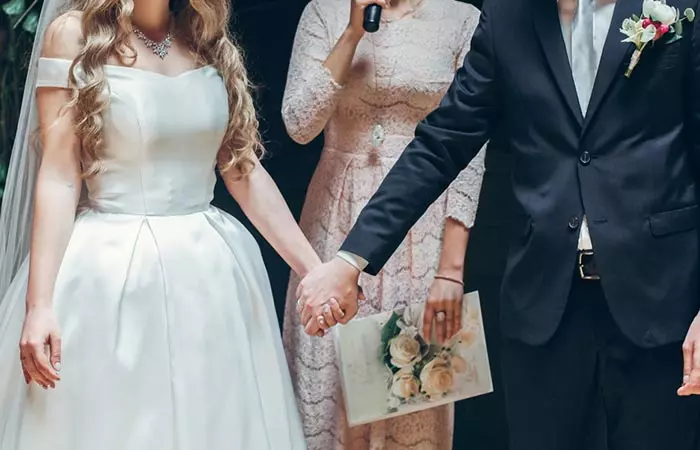
Run through the wedding script one last time and begin the ceremony. Remember to add in any announcements that the couple would like you to make before or after the ceremony, such as directing guests to cocktail hour or asking everyone to turn their phones off. Make sure you speak loudly and clearly so that everyone can hear you. Go by all the rules and traditions (in case you are following a specific one). If you have not memorized the script, keep a printed copy with you.
Usually, you can legalize the marriage by speaking the Declaration of Intent, or “Do you take…” and “I do” exchange. You can also use the Pronouncement where the officiant pronounces the couple as officially married.
David practiced the ceremony several times. When he was standing on the altar in front of the couple, he felt like their spokesperson. He writes, “I was their guide; not a spiritual guide, but rather a ritual guide. I was their trusted steward to ensure they made it through this day in one piece.”
Here are a few preparatory tips to ensure a smooth and memorable ceremony.
- Discuss with the key helpers of the events, such as photographers and decorators, to understand the event’s timing and schedule. This will help you to remain aligned with everyone.
- Meet the couple and ask if they have any special requests. Discuss their vows and confirm the pronunciation of their names. This personal connection will allow you to understand their needs better.
- Visit the venue before the wedding day to familiarize yourself with the space. If everyone agrees, you may conduct a run-through with the wedding party.
 Quick Tip
Quick TipStep 5: The After-Wedding Tasks
The wedding does not end with the script and pronouncement. To finally officiate the wedding, the minister or wedding officiant and the couple have to sign the marriage license. In some states and localities, witnesses also have to sign the marriage ceremony.
Once everyone has signed, the wedding officiate must return the wedding license to the country’s clerk’s office. The wedding becomes official and legal after all the paperwork is done and submitted.
Be careful about what you will say on the big day if you are a wedding officiant. Though wedding ceremonies have a standard format, customizing the words and tone and incorporating creative rituals can leave the couple and guests laughing, crying, and excited about what’s coming next. So, read on for quick tips that will inspire you and make your speech stand out.
What Do You Say When You Officiate A Wedding?
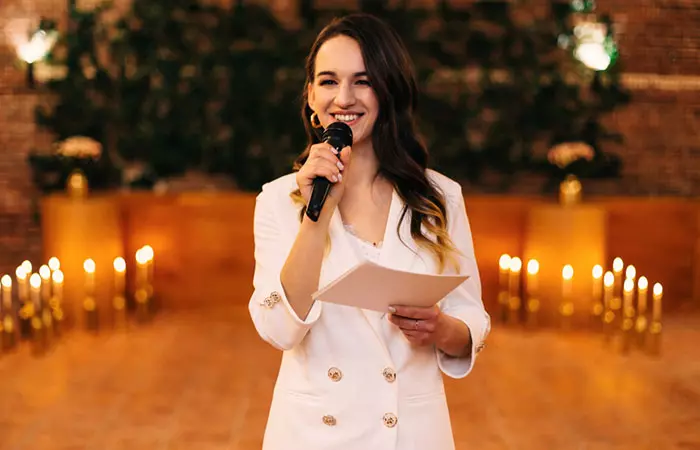
Writing a memorable wedding ceremony script is a tough task. You have to prepare a script that complements the wedding theme and feels relatable for the couple. Now, the best part is there are many wedding ceremony script ideas for you to take inspiration from for your special day. Here are some ideas you can try while deciding what to say during the ceremony:
- Start with welcoming sentences.
- Share a story about the couple or ask the couple to do so. Request the couple to share their promises with each other.
- You can also share your personal memory with the couple or express how much they mean to you.
- Involve family members of the couple through readings or blessings to personalize the ceremony script.
- Read a short poem or a dialogue from a book or movie close to the couple.
Check out these two sample wedding ceremony script introductions for some inspiration on how to start:
(i) Underneath this grand sky, we have come together to rejoice in the union of [Couple’s Names]. Today, we witness the beautiful fusion of two paths into one. With heartfelt promises and the exchange of rings, they will set forth on a shared adventure of lasting love. May their days be filled with happiness, growth, and everlasting love. Cheers to [Couple’s Names]!
(ii) Amid nature’s beauty, today we celebrate the union of [Couple’s Names]. Their love story takes center stage today as they exchange vows and rings, embarking on the quest of a new life together. May their path be adorned with laughter, understanding, and a love that blooms with every passing moment. Here’s to the wonderful journey of [Couple’s Names]!
Still not sure how to write a memorable wedding ceremony script? Worry not! We have the perfect thing for you. Go through the basic guidelines about writing a wedding ceremony script. You can customize them according to the wedding theme and couple’s choice. You are the chosen one, so be creative!
How To Write A Memorable Ceremony Script
- Welcome: Begin with a short welcoming speech for the family, friends, and guests and thank them for assembling to support the couple.
- Reading: Begin the introduction by either reading a quote or sharing the couple’s love story. You can also read from a religious text if it is a traditional wedding.
- Wedding Vows Exchange: Ask the couple to exchange their vows and declare their promise to love each other for a lifetime. Thoughtfully written wedding vows for him or her allow the groom or bride to share his or her love and devotion in a way that resonates with everyone, especially with the couple.
- Blessing: It is time to exchange wedding rings. Bless or wish them a happy union.
- Conclusion And Pronouncement: Declare that the couple is married by the power vested in you. Also, announce the bride and the groom as wedded partners and welcome a kiss.
Officiating a wedding for your loved ones is a huge honor, and this guide will help you succeed with this responsibility. Make sure you practice and plan for a smooth process. The job of a wedding officiant comes with some tricky rules (not the kind you can break), so brush up your public speaking and rehearse the ceremony.
Infographic: 5 Tips On How To Officiate A Wedding
The job of an officiant doesn’t end just after the couple is pronounced husband and wife. In fact, their work isn’t done until the marriage license is submitted and the union becomes official. If you want to officiate your loved one’s wedding like a pro, you have come to the right place. Check out this infographic to know more!

Illustration: StyleCraze Design Team
To officiate a wedding, the first thing you need to do is get ordained. This means researching the eligibility criteria, organizations, and local laws. Getting ordained also involves paperwork, so it is important to start the process well ahead. You need to be well-versed in wedding etiquette. Discussions with the couple regarding their wedding planning and what they want for the wedding ceremony are next. This helps you get insight into their love story and understand their vision for their wedding day and preparations for the wedding traditions. The third step is to prepare and practice what you want to say at the wedding party. The couple’s declaration of intent and proclamation by the officiant are the most typical ways to wed a couple. It is also better to check a few other things related to the wedding, such as the wedding reception, wedding music, wedding photography, wedding videography, and the wedding budget to make sure everything goes smoothly on the special day. In addition, you also need to preside over the signing of official wedding documents for the marriage certificate. And then, that’s a wrap.
Frequently Asked Questions
Does a wedding officiant introduce themselves?
Yes, the wedding officiant should briefly introduce themselves to the audience. The introduction can serve as an opportunity to set the tone for the rest of the officiant’s speech.
Does the officiant walk down the aisle to music?
Yes, the officiant is part of the wedding processional and traditionally walks down the aisle second, after the bride’s mother initiates the procession. However, the processional depends largely on the religion and customs being followed for the ceremony. For instance, in some cases, the wedding officiant leads the procession instead of the mother. Music may or may not be part of the procession, depending on individual preferences.
What is the difference between a marriage commissioner and an officiant?
A wedding officiant is a trained and licensed professional who can perform religious and secular weddings. They write their ceremony script and spend more time with the couple to get to know them, help with their vows, and take their input for the officiant’s speech. On the other hand, a marriage commissioner does not require any training and reads out a preapproved ceremonial speech. Marriage commissioners do not conduct religious ceremonies, though they are qualified to perform secular marriages.
Illustration: How To Officiate A Wedding And Write A Ceremony Script
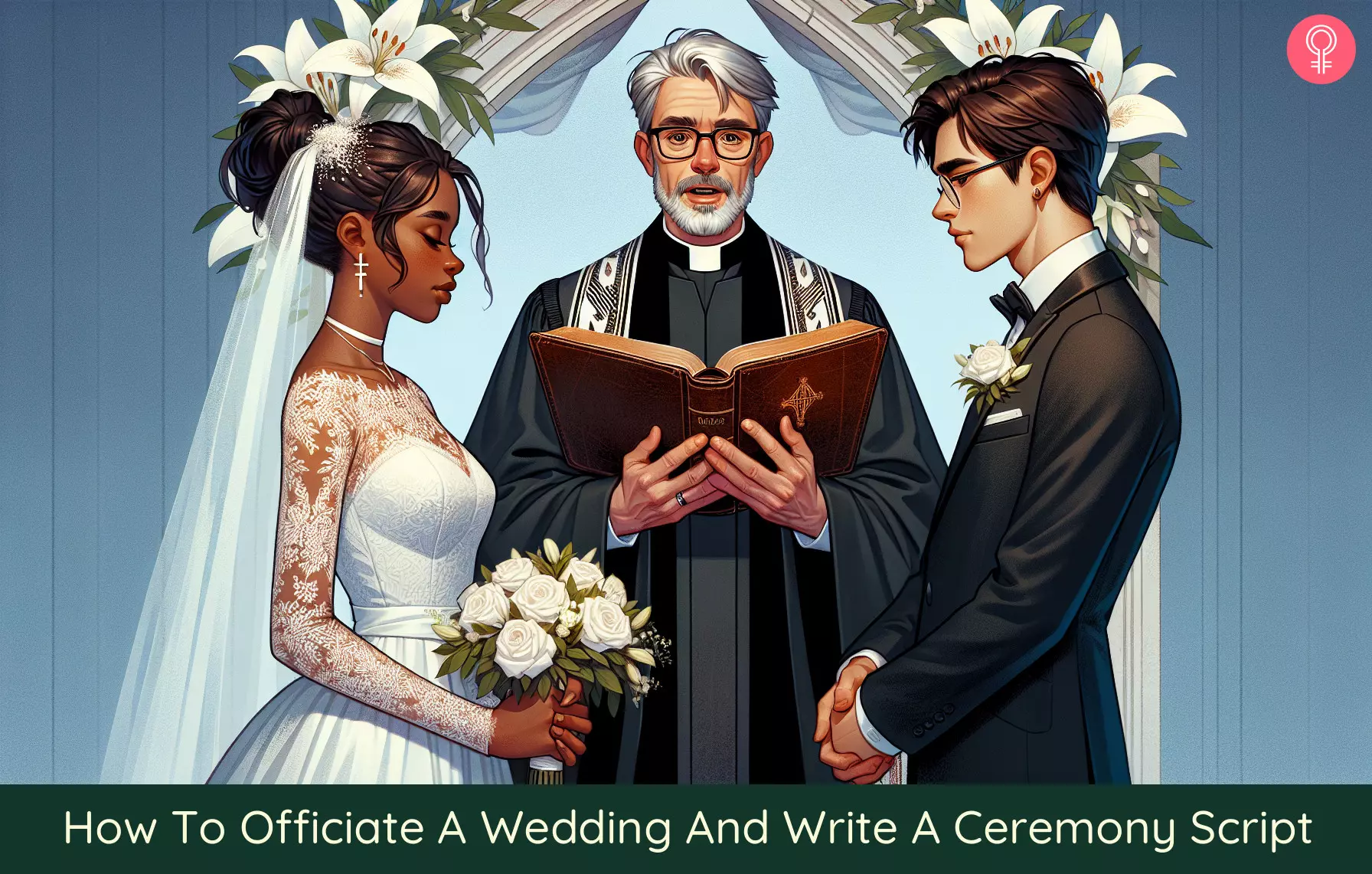
Image: Dall·E/StyleCraze Design Team
Do you desire to officiate weddings? Then you need to watch the video below. It provides 6 amazing pieces of advice to help you get started!
Personal Experience: Source
StyleCraze's articles are interwoven with authentic personal narratives that provide depth and resonance to our content. Below are the sources of the personal accounts referenced in this article.
i. Officiating My First Weddinghttps://felfoldi.wordpress.com/2013/05/08/officiating-first-wedding/
Read full bio of Melanie Levin
Read full bio of Sneha Tete
Read full bio of Subhrojyoti Mukherjee
Read full bio of Reshma Latif






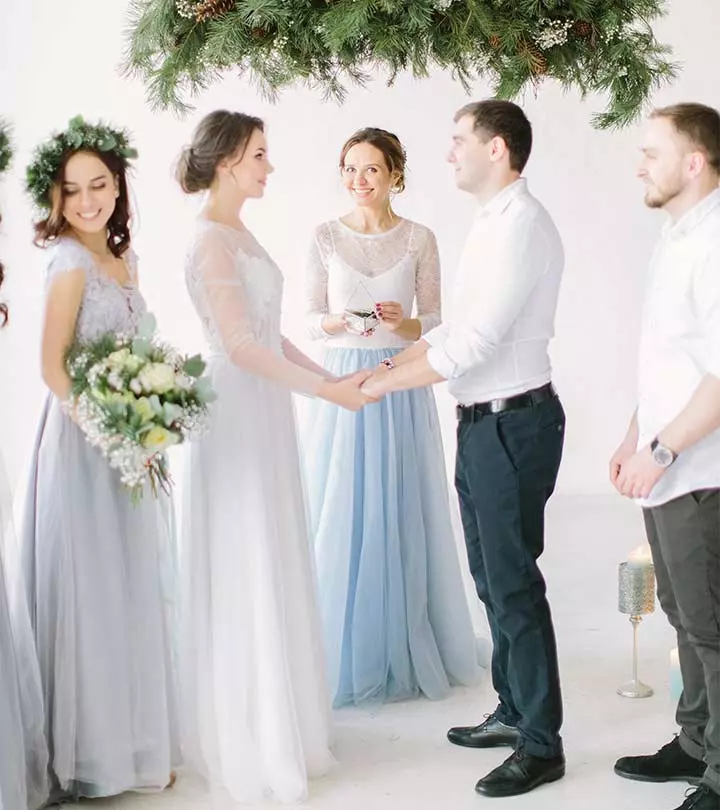
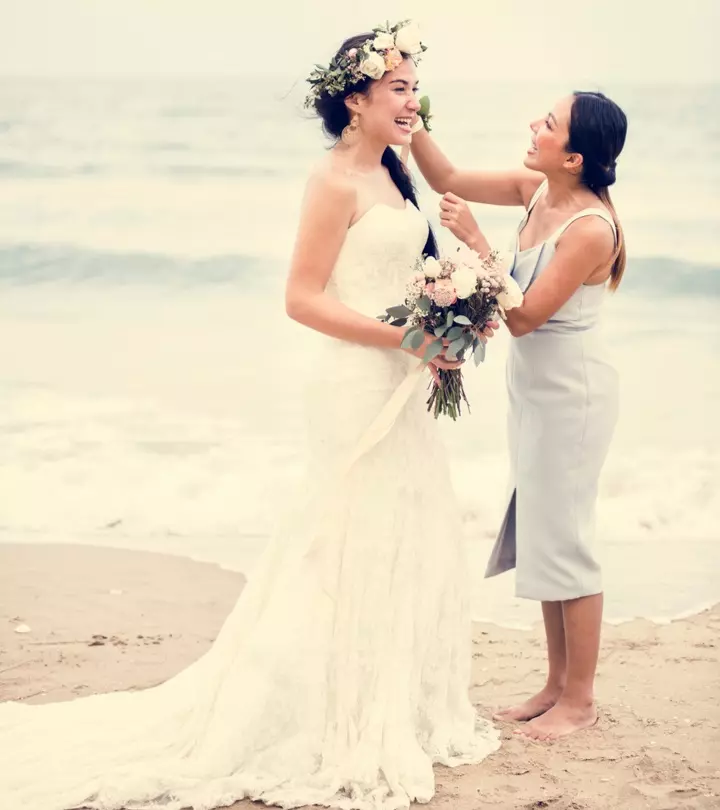

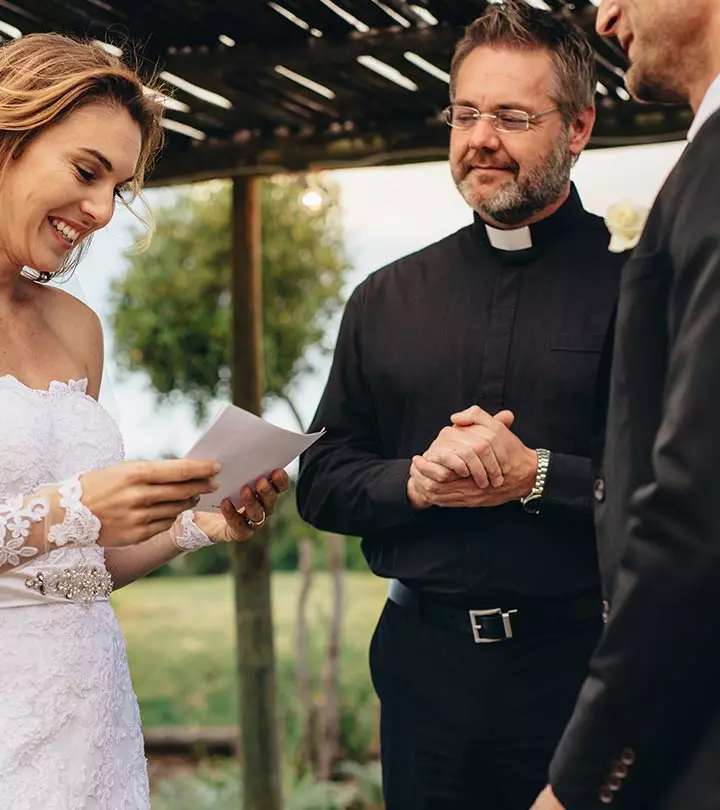
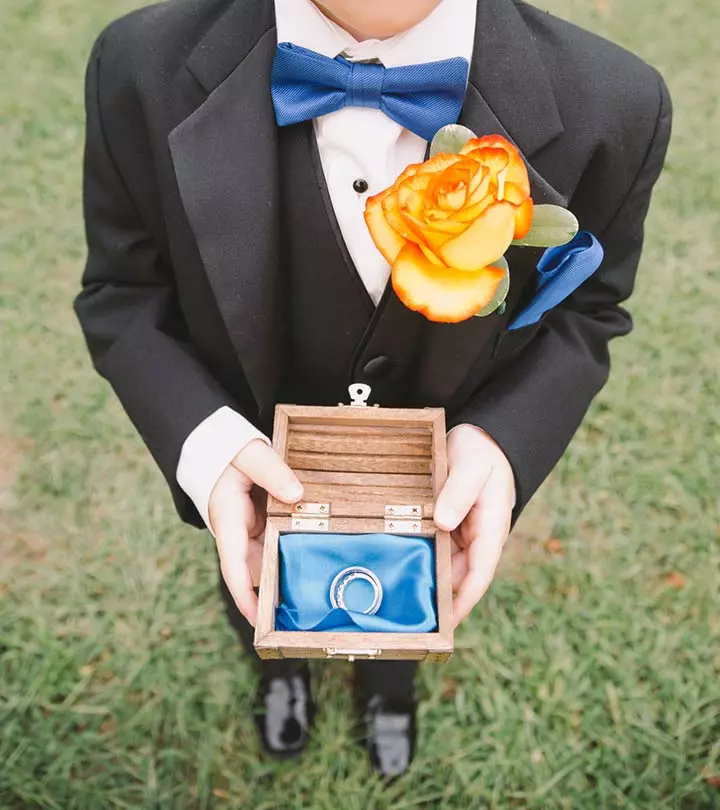
















Community Experiences
Join the conversation and become a part of our empowering community! Share your stories, experiences, and insights to connect with other beauty, lifestyle, and health enthusiasts.